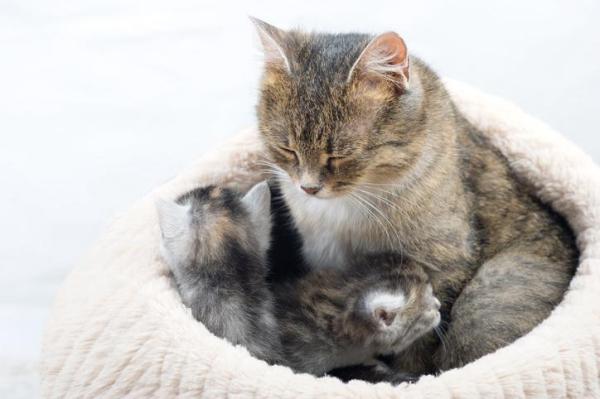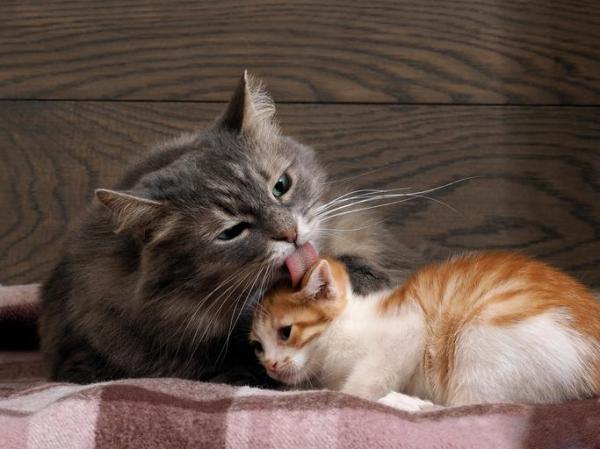
A mother cat provides everything for her newborn kittens. A newborn cannot regulate their temperature, see, hear or even defecate without the help of their mother. Importantly, neither can they feed. Female cats are mammals, so-called because they have mammary glands. These glands allow them to feed their young from breast milk they produce themselves. This breast milk is not simply food. The first milk, called colostrum, which cats provide their kittens is loaded with essential nutrients which helps to bolster the vulnerable young cat's immune system. The milk will slowly change, but it will still be packed with nutrients.
If a mother cat is not producing milk, then the kittens are in serious danger. Their ability to survive is under threat. AnimalWised looks into the possible reasons why a mother cat is not producing milk to help us know what to do if the worst happens.
How do you know if your cat is producing milk?
A cat not producing milk for their young is not at all normal. During pregnancy, the cat's breasts are preparing for their future milk production. The gland enlarge and, immediately after giving birth, they begin to produce colostrum. This first milk for cats is highly nutritious and performs an important immunological function. Kittens are vulnerable at birth, so they need protection from bacteria, viruses or anything else which can affect their immune system. This is one of the reasons a cat will nest before they give birth. They need to protect their newborn.
After the colostrum, regular cat milk is produced. The milk is secreted via the nipples on the cat's breasts. The kittens will latch on with their mouths and, as they grow, knead the breast with their paws. This is done to help stimulate lactation (milk production). This also helps the kittens to bond with their mother.
You may sometimes be able to see the milk being secreted or simply see it around the kitten's mouths. However, this will not always be the case. Still, you can know that milk is being produced if the kittens are nuzzling up to their mother's belly and suckling on her nipples. Kittens intuitively know how to suck. They will spend their time either suckling or sleeping. When there is no problem in the mother's lactation, the kittens will be quiet and sedate. They are well-fed and are having their other needs attended to by their mother. There should be no need to manipulate the mother's breasts to try to force secretion.

Why is a mother cat not producing milk?
Although very rare, it is possible a mother cat does not have milk for her kittens. If you want to know how we can tell a cat is not producing milk, we can look at the health of the kittens. A clear alarm signal would be that the idyllic scene of well fed young is not present. On the contrary, the kittens will be moaning and looking for food. They will be clambering over each other and trying to suckle at their mother without success.
Well-fed kittens will grow visibly fat around the belly from their feeding. If they haven't fed, this will not occur. Kittens which cannot feed will soon become dehydrated, cold, restless and more susceptible to disease. If we do not intervene quickly, the kittens will die. The first thing we need to do is take them to a vet. They will be able to confirm it is indeed a lack of milk production at fault and not some other pathology. They will also be able to provide emergency nutrition or provide fluid therapy if needed.
The reasons why a cat is not producing milk are hard to determine. They could be due to:
- Genetics: it is possible the cat will have a genetic problem which disallows them the ability to produce milk. There is nothing which can be done to fix this problem, so the cats will need to be artificially fed instead. The mother may not be aware she is unable to lactate.
- Malnutrition: when the mother cat is preparing for giving birth, she will feed regularly and prepare her body, She may stop eating just before delivery, but this is because she is needing to nest and get ready. However, if she has not been provided with enough food or has been unable to eat for whatever reason (e.g. sore tooth, throat problems, etc.), she may not be able to produce enough milk. Even if she is able to produce some, it may not be nutritious enough for the kittens' needs.
- Infection: if a mother cat has an infection, either bacterial or viral it can affect her breasts. Mastitis is the word for inflammation of the cat's breasts. If the breasts are swollen, they may be unable to produce milk. However, it would have to be a severe infection to prevent all of the nipples from producing milk. Whether the cat can produce no or some milk, the kittens should not try to feed. Especially in their vulnerable state, the infection may be passed on and harm them.
- Other disease: there may be other diseases which are preventing the cat from lactating. This includes problems like breast cancer, but the extent will depend on how far the disease has progressed.
- Stress: a cat which is very stressed may be unable to secrete milk. This is because kneading and suckling by the kittens produces the hormone oxytocin. The so-called ‘happiness hormone’, oxytocin is needed to release the milk. If the cat is highly stressed, this can lead to a lack of oxytocin and an inability to feed.
Recognizing the signs a cat is not producing milk is of vital importance. We need to act quickly otherwise the kittens can become malnourished and will die without intervention.
Can you make a cat lactate?
If we have a pregnant cat, then we must do everything we can to help them prepare. This means providing them with comfortable places to rest, sufficient food of high quality and hygienic living areas to keep them safe from disease. A healthy cat should, therefore, be able to produce milk when the time comes. If they cannot, our first idea might be that we can find a way to stimulate milk production.
Unfortunately, there is no quick cure or magical food which can make the mother cat start producing milk. If the problem is an infection or disease, then the problem will need to be treated. This is a process which takes time, something the kittens will not have very much of. If the problem is genetic, then there may be no way at all for them to produce milk, no matter what we try. With stress, we might be able to calm the cat down by providing a relaxing environment and removing any stressors. However, this is something much more easily said than done.
If a mother cat is unable to produce milk, there is only one real option. You will have to artificially feed the kittens.

How to artificially feed kittens
After going to the veterinarian and confirming the mother cat is unable to produce milk, we should listen to their advice as to what to do next. They will be able to treat any secondary illnesses or issues which need immediate treatment. If the kittens are malnourished or their immunity is compromised, they may need emergency treatment. This is why it is so important you take them to the veterinarian.
The vet will also be able to advise on how to artificially feed the kittens. If the kittens have had no milk at all, they will need artificial colostrum to boost their immune systems. After they have been fed this, they can be fed artificial kitten milk. You should follow the instructions on a particular product, but you should ask the vet to recommend a quality brand which is available in your region.
Before offering the artificial formula to the kittens, we need to check the temperature. If the milk is too hot or too cold, then the kittens may not be able to feed. Kittens will need fed very regularly at first, around every 2 hours. It is vital we don't use other types of milk as they may not be able to provide the nutrition the kittens require.
When feeding the kitten, you should hold them under the chest and keep their legs resting on our lap. Tilting their head up will help them to swallow the milk. We should let them drink and suckle naturally, not try to force the milk into their mouths. As the kitten grows, they will need less milk. By three weeks of age, we can start introducing solid food. Read our article on the weaning process in cats to know what you will need to do.

If you want to read similar articles to Mother Cat is Not Producing Milk, we recommend you visit our Lactation category.